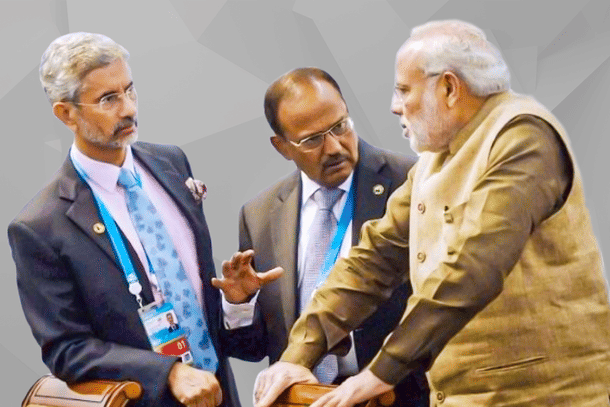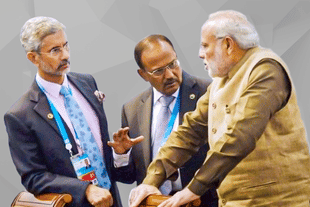Foreign Affairs
How The Modi-Jaishankar-Doval Trio Secured The Release Of Eight Navy Veterans From Qatar
Jaideep Mazumdar
Feb 14, 2024, 09:46 AM | Updated 01:16 PM IST
Save & read from anywhere!
Bookmark stories for easy access on any device or the Swarajya app.


The unconditional release of the eight Indian Navy veterans from prison in Qatar and their arrival in New Delhi early Monday (12 February) morning was nothing short of historic and represented a major diplomatic victory by India.
Historic because it is the first time that a country released foreigners convicted of very grave charges like espionage to their native country.
The eight, who were working for Oman-based Dahra Global — a defence services company — post their retirement, were arrested on 30 August 2022 on espionage charges.
Though the charges were never made public, it is believed that the eight were working on a nuclear submarine project for Qatar and were accused of passing on confidential information on the project to Israel.
Over a year later, on 26 October 2023, the eight were awarded the death penalty by Qatar’s Court of First Instance.
Two months later, on 28 December last year, Qatar’s Court of Appeals commuted the death sentences to prison terms varying from three to 25 years and gave the eight 60 days to file appeals.
An Indian legal team has been assisting the eight to file appeals against their conviction in Qatar’s Court of Cassation, the highest court in the country’s judicial system.
“The release of the eight convicted Navy veterans while their cases were still pending in a court is a major diplomatic victory for India and is unprecedented,” a senior diplomat in the Ministry of External Affairs (MEA) told Swarajya.
“The Emir of Qatar has pardoned and released prisoners in the past. Similarly, prisoners have been pardoned and released in many other countries as well. But it never happened when their cases (in this case, their appeals) were still pending in courts and a final order by the judiciary was awaited. Also, Qatar and many other countries have never released prisoners convicted of espionage,” the joint secretary-level officer in the MEA said.
New Delhi had been working behind the scenes over the past 17 months to secure the release of the navy veterans, some of them decorated officers who commanded front-line battleships.
Soon after they were arrested in August 2022, Prime Minister Modi is said to have asked External Affairs Minister (EAM) S Jaishankar to initiate talks with Qatar on their release.
“Right from day one, the goal was to secure their unconditional release and return to India,” the MEA officer said.
Jaishankar constituted a group of six serving and retired diplomats — all with rich knowledge and experience of the Middle East and West Asia — to oversee the matter and negotiate with Qatar.
After considerable efforts, Qatar shared the details of the charges with New Delhi but asked that the matter be kept confidential and out of public domain.
India launched its own investigations and came up with evidence that the eight Navy veterans were not involved in passing on any detail of Qatar’s secret submarine project to Israel.
New Delhi also leaned on Oman, a country India has close ties with, to get Dahra Engineering & Security Services LLC (Dahra Global, the company the eight were working for) to come clean on what actually transpired.
The Sultan of Oman, Haitham bin Tariq, with whom Prime Minister Modi shares warm ties, was requested to help in getting Dahra Global CEO, Khamis al-Ajmi, a retired officer of the Oman Air Force, to pitch for the release of the eight.
Khamis al-Ajmi was also arrested by Qatari authorities along with the eight but was released in November 2022 after intense pressure from Oman.
A prominent Indian expatriate London-based businessman who has close links with Oman’s crown prince, Theyazin bin-Haitham, was also drafted in.
This businessman also has close links with Qatar’s premier, Mohammed bin Abdulrahman al-Thani, and that was also leveraged by New Delhi.
India also requested Iran, with which it enjoys close ties, to intervene. Iran and Qatar are close allies in the Middle East.
After Qatar shared details of the charges against the eight, matters started progressing smoothly and by May-June last year, it appeared that the charges against the eight would be diluted.
India’s National Security Advisor (NSA) Ajit Doval was drafted in and he made a couple of low-key visits to Doha where he met his counterpart, Sheikh Mohammad bin Ahmad Al-Musnad.
Doval struck a good rapport with the Qatari NSA and also spoke to his US counterpart, Jake Sullivan on the issue. EAM Jaishankar also reached out to US Secretary of State Anthony Blinken to request him to intercede with Qatar on India’s behalf.
Qatar has developed close ties with the US which has designated the Gulf nation as a ‘major non-NATO ally’.
Qatar has very close military ties with the US and is the US Central Command’s forward headquarters. The Al Udeid Air Base in Qatar is the largest US Air Force base in the Middle East. The US Army is stationed at the Al Sayliyah Army Base in Qatar.
Sullivan and Blinken, as well as top US State Department officials, intervened on India’s behalf and requested Qatar to step back from prosecuting the eight Indian Navy veterans.
But things took an unexpected and serious turn with the Hamas attack on Israel on 7 October last year, triggering retaliation by Israel and a crisis in that region.
Qatar is close to Hamas and hosts the top political leadership of that group. India is perceived to be close to Israel.
That is why, when Qatar’s First Court of Appeals awarded the death penalty to the eight navy veterans, it set alarm bells ringing in the PMO and MEA.
“We realised that something very bizarre was happening and immediate intervention was needed,” the MEA diplomat said.
New Delhi made urgent calls to Doha, Washington, Tehran, and Muscat seeking intervention. All these countries responded positively.
Doval made a couple of low-key visits to Doha once again. EAM Jaishankar spoke to his Qatari counterpart.
Prime Minister Modi decided he would have to intervene personally and take up the matter with the Emir directly. The MEA got working and a meeting was fixed between Prime Minister Modi and Emir al-Thani at the margins of COP28 in Dubai on 1 December last year.
PM Modi, it was known, appealed to the Emir to pardon the Navy veterans. NSA Doval had, by then, laid out irrefutable evidence before his Qatari counterpart Sheikh Mohammad bin Ahmad Al-Musnad that the eight Indian Navy veterans were innocent of the charges of passing on secret information about Qatar’s nuclear submarine project to Israel.
Modi also highlighted India’s efforts to build close ties with the Middle East and his India-Middle East-Europe Economic Corridor project that would bring immense benefits to Qatar and its ally Iran.
Reminding the Emir of India’s commitment to boost the USD 15.03 billion bilateral trade between the two countries, Modi said that India’s quest for clean energy would benefit Qatar (which has huge reserves of natural gas) a lot.
India does have considerable leverage in Qatar: more than eight lakh Indians work in Qatar, some at very senior levels in MNCs and as senior technical and management advisors to Qatar. More than 6000 Indian companies operate out of Qatar.
The meeting between Modi and Emir al-Thani was successful and on 28 December last year, the Court of Appeals commuted the death sentences to jail terms.
New Delhi heaved a sigh of relief but redoubled its efforts to secure pardons for the eight Indians.
EAM Jaishankar and the team of six (serving and retired diplomats) focused their efforts in not only filing a strong and cogent appeal on behalf of the eight against their convictions but also getting the Emir to pardon the eight.
“We did not want to wait till the Court of Cassation in Qatar heard the appeals. That would have taken another three to four months at least. Given the unpredictability of developments in the Middle East and West Asia, we did not want to leave anything to chance and aimed for a pardon by the Emir,” said the MEA diplomat.
As a result of intense efforts by India, the Emir ultimately agreed in principle about two weeks ago to grant the pardon.
But Qatar’s Prime Minister, Sheikh Mohammed bin Abdulrahman Al-Thani, who is also the country’s foreign minister, suggested to EAM Jaishankar that the pardon could wait till the start of Ramzan (10 March).
Such pardons or remission of jail terms are usually granted during the Islamic holy month of Ramzan.
However, Prime Minister Modi did not wait till March. He asked EAM Jaishankar and NSA Doval to secure the release within February. After considerable persuasion, Qatar ultimately agreed to pardon the eight Indian Navy veterans.
The pardon decree was issued by the Emir’s office Friday (9 February) — a holy day in Islam and the usual day for issuing pardons and benevolent decrees — and the last-minute modalities for the release of the eight were worked out over the next two days.
The eight were released Sunday (11 February) and seven of them were flown out of Doha that evening. Only one of them — Commander (retired) Purnendu Tiwari — remains in Qatar at his relative’s place since some formalities about his return to India are still being worked out.
The release of the eight Navy veterans who were convicted of espionage — a very grave offence that invariably carries the death penalty — is, thus, a historic victory for India.
Not only were the eight charged with spying, they were convicted of doing so for Israel. Till now, no person convicted of spying for an adversary country has been pardoned and released from prison in Qatar.
India could pull off this diplomatic coup thanks to its new heft at the global level and the goodwill it has cultivated among nations across the globe.





